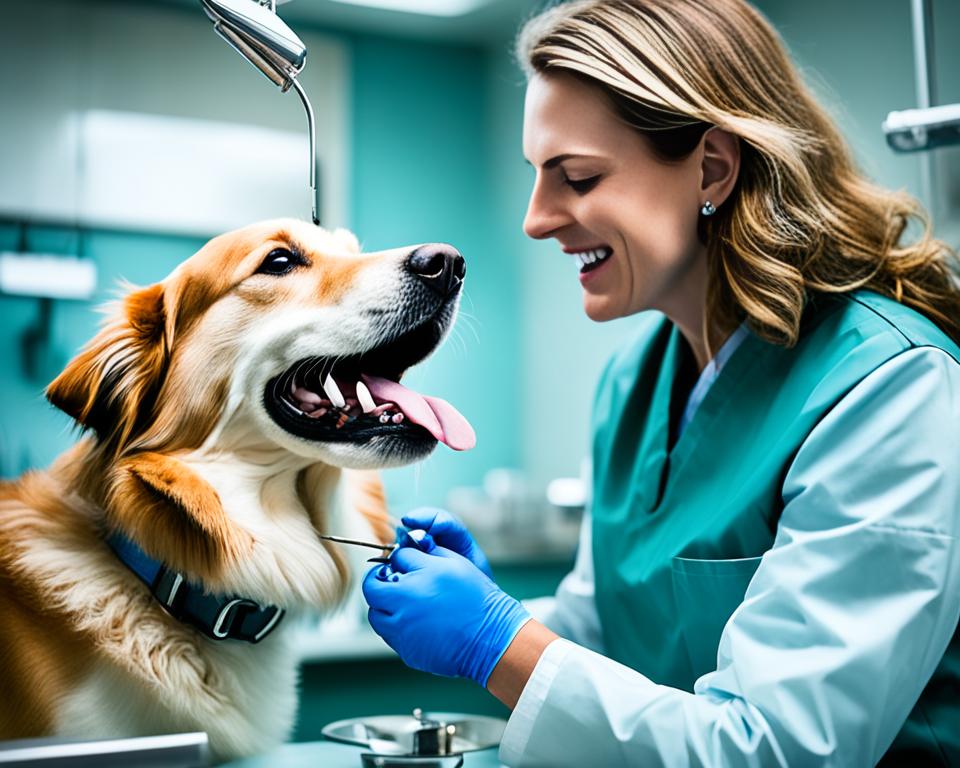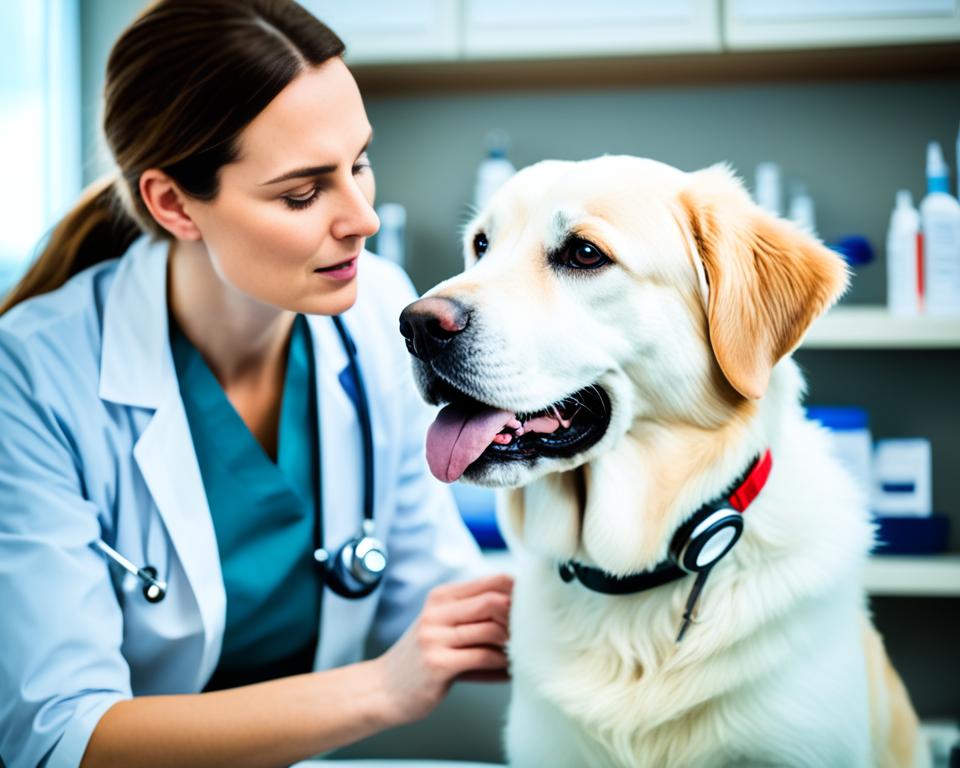As a dog owner, I know how important it is to keep my furry friend healthy and happy. Good dog health starts with proper pet care and regular veterinary advice. A well-rounded approach to canine wellness can make a big difference in your pet’s life.
Annual wellness visits are crucial for dogs. Dogs that go for yearly check-ups live longer and healthier lives. It’s not just about treating problems; it’s about preventing them.
During these visits, I make sure my dog gets all necessary vaccinations. This protects them from serious diseases.
Nutrition is key to dog health too. I pay close attention to my dog’s diet. It must be balanced and suited to their needs.
Exercise is also vital. Daily walks and playtime keep my dog fit and happy. This reduces the risk of obesity-related health issues.
Preventive care is another key aspect of pet care. I use monthly preventatives for heartworm, fleas, and ticks. This simple step lowers the risk of these common pet health problems.
I also keep an eye out for any unusual symptoms. If I notice anything strange, I seek veterinary advice right away.
The Importance of Regular Veterinary Check-ups
Regular vet visits are key to keeping your furry friend healthy and happy. It’s vital to schedule routine check-ups for your dog. These visits help prevent health issues and save you worry and money.
Annual wellness visits
Yearly check-ups are a must for your dog’s health. At these visits, your vet can catch early signs of problems. They can spot eye issues like glaucoma or cancer early.
Blood, urine, and stool tests can find issues like diabetes or heartworms. These tests are crucial for your dog’s health.

Vaccinations and boosters
Vaccines are key to keeping your dog safe. Your vet will make a vaccination plan for your dog. This plan depends on your dog’s age, lifestyle, and risks.
These shots protect against diseases like rabies, parvo, and distemper. Keeping up with boosters ensures your dog stays safe.
Routine bloodwork and fecal exams
Regular screenings give deep insights into your dog’s health. Blood tests check how organs like the liver and kidneys are doing. Fecal exams look for parasites that might be there.
These tests are great for finding health issues early.
| Test | Purpose | Frequency |
|---|---|---|
| Physical Exam | Overall health assessment | Annually |
| Blood Test | Check organ function | Annually |
| Fecal Exam | Detect parasites | Annually |
| Dental Check | Prevent gum disease | Annually |
Early detection through regular vet visits can save a lot of money and help with treatment. Make sure to put vet care first, just like feeding and playtime. Your dog’s health and happiness depend on it!
Nutrition: The Foundation of Dog Health
Proper canine nutrition is key to your dog’s health. It’s important to pick the right dog food and know what they need to eat. This keeps your furry friend healthy.
Choosing high-quality dog food
When picking dog food, I look for AAFCO-approved labels. These labels mean the food meets certain nutritional standards. Good dog food should have protein as the first ingredient. Adult dogs need at least 18% protein, and puppies need 22%.

Understanding your dog’s dietary needs
Dogs need six key nutrients: water, carbs, vitamins, minerals, fat, and protein. The best diet has about 30% protein, 25% carbs, and 15-25% fat. I adjust these amounts based on my dog’s age, breed, and how active they are. This keeps them healthy.
The role of treats in a balanced diet
Treats are part of your dog’s diet, but don’t overdo it. I keep treats to 10% of their daily calories. For healthier treats, I use apple slices or baby carrots. Too many treats can make your dog overweight and lead to health problems.
| Nutrient | Recommended Percentage | Importance |
|---|---|---|
| Protein | 30% | Essential for growth and maintenance |
| Carbohydrates | 25% | Provides energy |
| Fat | 15-25% | Supports skin and coat health |
| Fiber | 2.5-4.5% | Aids digestion |
Exercise and Physical Activity for Canine Well-being

Dog exercise is key for your pet’s health. It keeps them fit in body and mind. It’s more than just burning off energy; it’s about making their life better.
Dogs need different amounts of exercise. Some like short walks, others want more action. I make sure my dog gets the right amount based on their breed and energy.
Being fit is important for dogs. It helps prevent obesity, stops bad behaviors, and keeps their minds sharp. I keep my dog happy with daily walks, backyard games, and trips to the dog park.
“Exercise can decrease stress-related hormones such as cortisol and epinephrine in dogs, leading to improved mood and overall well-being.”
Studies show exercise is good for dogs. Inactive dogs are more likely to have brain problems. Exercise also helps grow new brain cells in dogs.
| Benefits of Dog Exercise | Impact on Dogs |
|---|---|
| Weight Management | Reduces risk of obesity-related health issues |
| Mental Stimulation | Decreases destructive behaviors |
| Stress Reduction | Lowers cortisol levels, improving mood |
| Cognitive Function | Promotes brain cell growth and mental acuity |
A healthy dog is a happy dog. By focusing on exercise and fitness, we’re doing more than just keeping them fit. We’re giving them a long, happy life.
Preventative Care: Parasites and Disease Prevention
As a dog owner, I know how important it is to keep our furry friends healthy. Keeping them safe from parasites and diseases is key. It’s not just about their comfort; it’s about their long-term health and happiness.
Monthly Preventatives for Heartworm, Fleas, and Ticks
I always give my dog monthly treatments for heartworm, fleas, and ticks. These treatments are powerful against parasites. The American Heartworm Society says to test for heartworms every year. I use these preventatives all year, especially in places where heartworm is common.
The Importance of Parasite Prevention
Preventing parasites is more than just keeping dogs comfy. It protects them from deadly diseases like heartworm and cuts the risk of diseases that can spread to people. I keep my dog clean, groom them often, and clean up after them. These steps help with flea and tick control and keep parasites away.
Recognizing Signs of Common Dog Diseases
Being alert about dog diseases is key for pet parents. I watch for changes in my dog’s behavior, eating, or looks. Signs of parasites include diarrhea, losing weight, vomiting, and feeling tired. Regular vet visits, once or twice a year, catch problems early. Prevention is cheaper and easier than treating diseases later.

